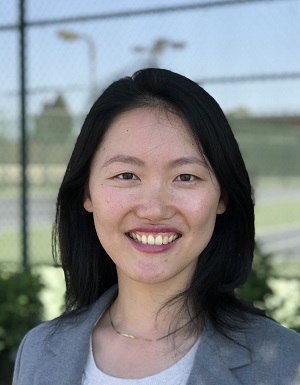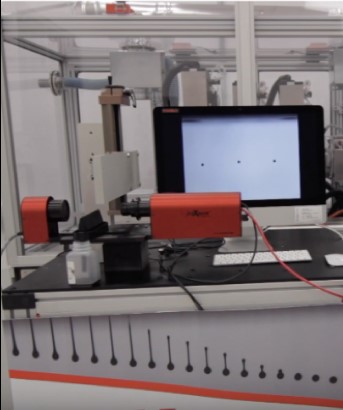
Professor Qian Yang

Professor Anson Ma
Computer Science & Engineering professor Qian Yang and Chemical & Biomolecular Engineering professor Anson Ma are literally shaping the way we use 3D printing. The professors joined forces on two projects, funded by the National Science Foundation and The United States Department of Agriculture, to monitor the 3D printing process for detection of defects in real time and to develop a reliable 3D printing method for transforming pulses into novel food products.

The HuskyJet, a state of the art Pilot Scale inkjet 3D printer, is located in Dr. Anson Ma’s lab at UConn.
Real-time defect detection is key to improving the printing process and qualifying 3D printed parts. This detection can be used to inform decisions such as whether to abort a print process or apply corrective action to compensate for detected defects. Dr. Yang and Dr. Ma’s research project, titled Machine Learning-Enabled In-Progress Defect Detection and funded by the National Science Foundation through the SHAP3D Industry University Cooperative Research Center, leverages state-of-the-art deep learning techniques to achieve real-time defect detection and localization, while automatically pre-processing images for color and lighting consistency so that this can be achieved without requiring modifications to cameras and hardware. “The additive manufacturing industry, which is expected to top $20 billion in the next five years, has the potential to drive important advancements in varied industries ranging from medicine to aerospace to consumer products,” says Yang. “To truly enable additive manufacturing at scale, machine learning will play a key role in accelerating the development of efficient, robust, and automated 3D printing technologies.”
The professors’ second joint project, funded by the United States Department of Agriculture and titled 3D Food Printing, focuses on research that will positively impact the food supply chain and empower consumers through the development of automated food printers to create products with excellent shelf life, nutrition, sensory attributes, and minimal food waste.
Dr. Yang leads the machine learning portion of the project, focusing on the challenge of optimizing the 3D printing process for new feedstock materials. The success of 3D printing depends on a tedious trial-and-error approach to finding an optimal combination of feedstock materials and printing process parameters. Dr. Ma and Dr. Yang address this challenge through physics-based modeling and machine learning to optimize waveforms and other parameters for inkjet printing. They will leverage active learning methods to design efficient experiments and generative adversarial networks for physics modeling.
“Through these two projects,” Yang adds, “we will demonstrate how machine learning can be used to fully optimize the 3D printing process, from the selection of printing materials and process parameters (USDA project) prior to printing, to online monitoring and corrective action during and after printing (NSF SHAP3D project).”
SHAP3D is a collaboration between the University of Massachusetts Lowell, University of Connecticut and Georgia Institute of Technology. The mission of the SHAP3D Center is to perform pre-competitive research providing the fundamental knowledge for additively printed heterogeneous products that integrate multiple engineering materials with complex 3D structures and diverse functionality. For more information on this partnership, affiliated researchers and ongoing projects, please visit https://www.uml.edu/research/shap3d/

School of Computing
371 Fairfield Way, Unit 4155
University of Connecticut
Storrs, CT 06269-4155
Phone: (860) 486-3719
Fax: (860) 486-4817